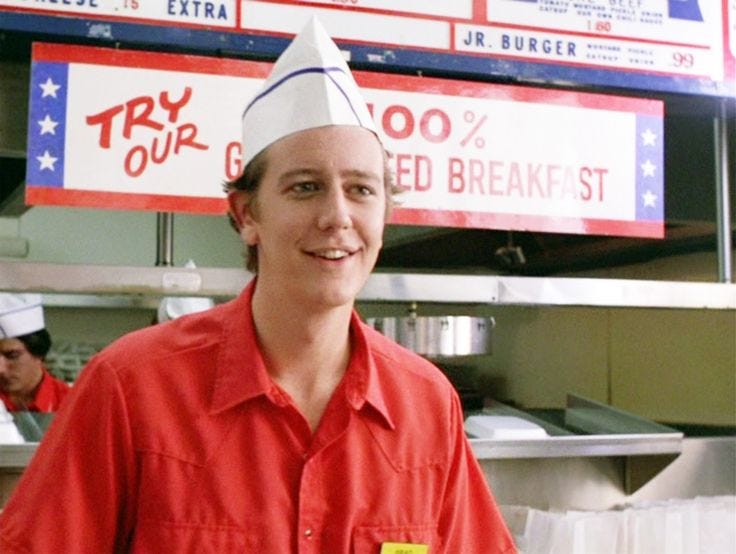Why the Next Generation May Never Work at Arby’s
The death of entry-level work can be a catalyst for the rise of self-made careers.
Yesterday, I stopped into a Del Taco in Southern California.
To my surprise, there was no one to greet me at the counter. Instead, all I saw was a giant computer screen to self-order. Of course, I have seen these grotesqueries before at the airport—the same noxious place where they roll out so many other dehumanizing gadgets such as facial recognition technologies.
But this was the first time I’d seen such a thing in the heart of suburbia.
When Fast Food Goes Fully Automated
Before we get into how this development will affect the future of work—and life as we know it—let’s pause to acknowledge the stupidest part of this “timesaver.” Halfway through ordering my kids their hashbrowns on a giant touchscreen smacking of minimalist Tesla-aesthetics, the elderly couple beside me hit a snag on theirs. This entirely predictable hiccup prompted the manager to reluctantly emerge from the back of the store and help them with their order.
See the irony?
The same tech that supports replacing face-to face human interaction—the most important aspect of life that we insist on automating—still requires people. Just like how every time I am at the grocery store it still requires some cashier to help people with their own self-checkout.
From Jobs Reports to Job Replacements
Zooming out from this laughably troubling experience, I am reminded of the dismal jobs report that appeared Friday. Here’s how CNN framed the disappointing numbers: “After years of plentiful employment opportunities, healthy pay bumps and pandemic savings-fueled spending sprees, American workers now face a sobering economic reality: It’s getting harder and harder to find work, and more and more industries are shedding jobs.”
Soon after reading about how the U.S. economy only added 22,000 jobs in August and the unemployment rate has inched up to 4.3%, the highest it’s been in nearly four years, I had the chance to listen to former Labor Secretary Robert Reich appear on PBS Newshour in a piece titled “How the Next Wave of Workers Will Adapt as Artificial Intelligence Reshapes Jobs.”
Like so many pundits Reich made a compelling case about the need for workers to retool their skillsets for the modern era, something OpenAI hopes to achieve through its new initiative, the OpenAI Jobs Platform.
But what if all these efforts are wrongheaded?
Let me explain my thinking. Growing up, I was taught to believe I should go to college to get a good job. But what if the future of economic security doesn’t belong to W2 employees like it did decades ago? What if the best way to ensure your vocational relevance is to create and operate your own business?
Returning to the Del Taco situation, let’s now ponder the societal implications of automating all those customer service roles that were once fulfilled by high school students or others just entering the workforce.
What We Lose When Entry-Level Jobs Vanish
One of my own first jobs was working at Arby’s.
Among other things, I learned how to talk to people, especially the frustrated variety. Let me tell you something: you really discover untapped interpersonal skills when the register line is 10 deep, and the shake machine goes out in the midst of a lunch rush.
Likewise, the challenge of turning a negative customer experience around in the drive-thru lane while your coworkers yell at you to move it along teaches you volumes about interpersonal problem solving, lessons that are utterly applicable in so many walks of life, especially being an entrepreneur responsible for closing deals.
And yet, so many companies are outsourcing these roles to computers and code. Honestly? I don’t blame them entirely. Have you seen the way so many entitled Gen Z employees treat customers? Example: I shouldn’t be the one thanking them for my order—it should be the other way around.
Thank you for understanding that small digression.
The point is blame is due all around for our dismal state of affairs workwise. Meanwhile, as always, AI, amplifier that it is, is shifting the ground beneath our feet. Smart tech is gobbling up so many jobs like candy, transforming the zeitgeist in profound ways we can scarcely comprehend.
The Case for Building Your Own Future
But that’s the point of having this Substack—to discuss the news items we are not talking about nearly enough. So, here’s my advice for the hypothetical young person like me who might’ve worked at Del Taco at age 16 if not for the fact they were replaced by a touchscreen: start your own business.
And just to show you my advice isn’t hollow pontificating—I’ll even give you a business idea to boot. You know how all those apps like Tinder are making it increasingly harder for people to connect in real life (IRL) like we once did with competence and ease? Use that problem as a customer pain point.
Put out your shingle as an in-person matchmaker, first for your friends seeking companionship in our lonely era—then for the wider public.
Knowing that there’s a growing backlash against superficial relationships engendered by swiping left or right—I can’t remember which—leverage AI to promote IRL experiences where you pair up people for analog activities: zip-lining, horseback riding, even just going out to dinner. In this way, AI can be an amplifier for greater connection. It can also help you scale your business.
That way you never have to work at some job where they’ll one day tell you’re no longer needed. Now, that’s economic security for the AI age.

